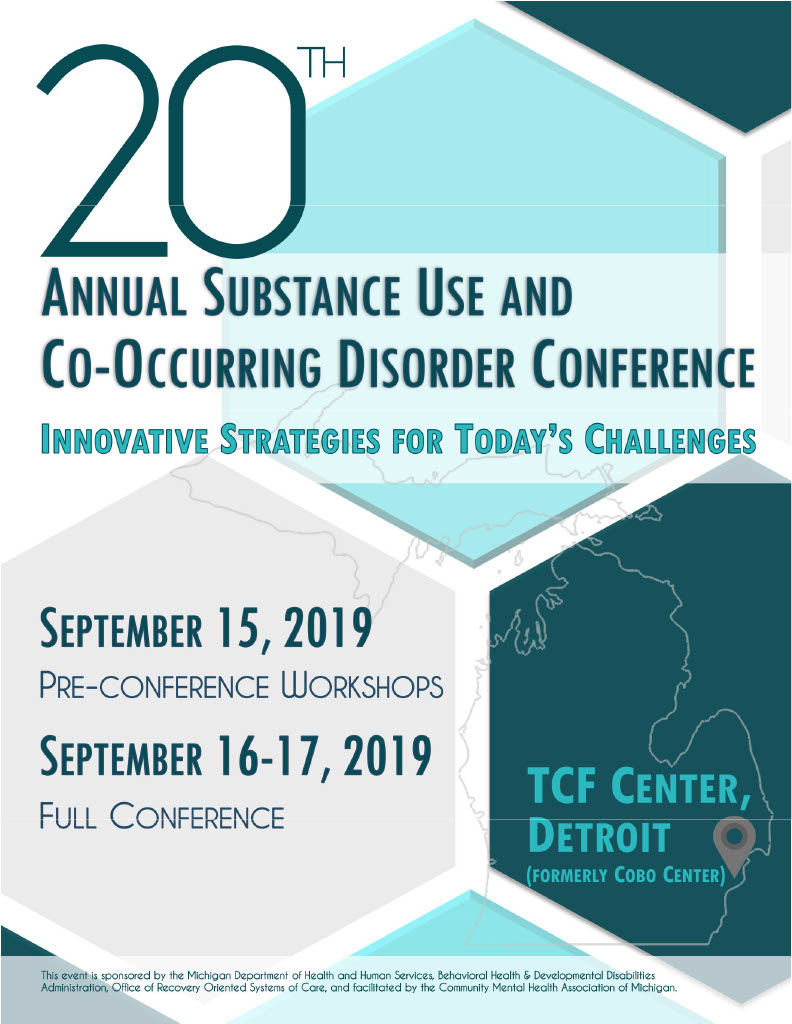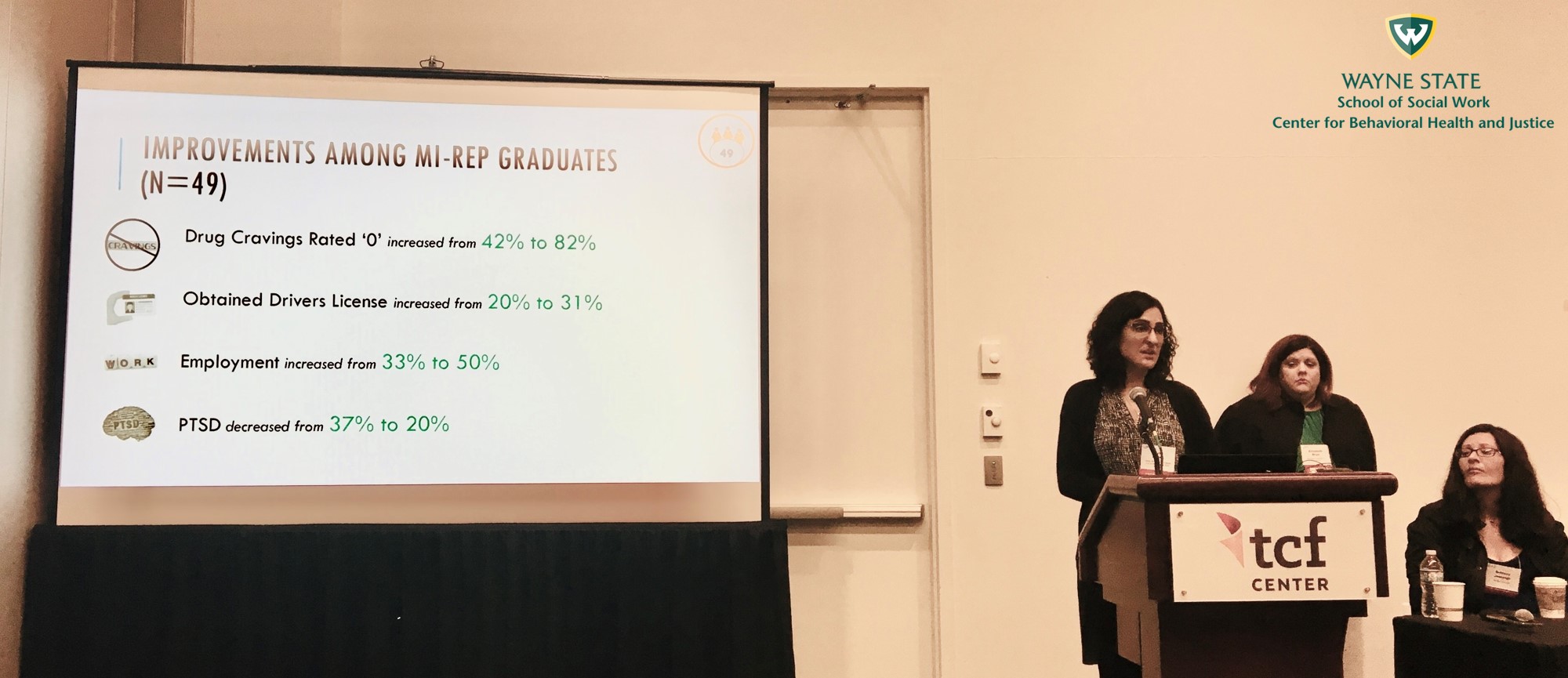The CBHJ presents MI-REP outcomes at the 20th Annual Substance Use Disorder and Co-Occurring Disorder Conference
 The 20th Annual Substance Use Disorder (SUD) and Co-Occurring Disorder (COD) Conference took place at the TCF Convention Center in Downtown Detroit September 16-17, and the work of the Wayne State University (WSU) School of Social Work (SSW) Center for Behavioral Health and Justice (CBHJ) was represented by Associate Director Julie Hanna. The conference was attended by fourteen hundred people, and this year's theme was "Innovative Strategies for Today's Challenges". Hanna spoke about the CBHJ's work with the Michigan Re-Entry Project (MI-REP) alongside an impressive, interdisciplinary panel including Beth Boyd (Substance Abuse Services Manager at the Michigan Department of Corrections), Wanda Nixon (MI-REP Case Manager at Oakland Family Services), Marc Slotnick (MI-REP Peer Recovery Coach), and MI-REP program graduate Brittany, holding her infant son.
The 20th Annual Substance Use Disorder (SUD) and Co-Occurring Disorder (COD) Conference took place at the TCF Convention Center in Downtown Detroit September 16-17, and the work of the Wayne State University (WSU) School of Social Work (SSW) Center for Behavioral Health and Justice (CBHJ) was represented by Associate Director Julie Hanna. The conference was attended by fourteen hundred people, and this year's theme was "Innovative Strategies for Today's Challenges". Hanna spoke about the CBHJ's work with the Michigan Re-Entry Project (MI-REP) alongside an impressive, interdisciplinary panel including Beth Boyd (Substance Abuse Services Manager at the Michigan Department of Corrections), Wanda Nixon (MI-REP Case Manager at Oakland Family Services), Marc Slotnick (MI-REP Peer Recovery Coach), and MI-REP program graduate Brittany, holding her infant son.
The panel presentation was attended by about 150 individuals, all of them eager to ask their questions right from the start. Hanna presented evaluation outcomes with a slideshow presentation of some of the data collected on the success of MI-REP participants and the program's 76 graduates to date (a sample can be seen in the photo below). As she spoke, there were audible whispers among the attendees discussing how impressed everyone was with the success rate they were seeing. Hanna explained that MI-REP is a multi-system collaboration among the Michigan Department of Health and Human Services (MDHHS), the Michigan Department of Corrections (MDOC), Prepaid Inpatient Health Plans (PIHPs), WSU, the University of Massachusetts, and is offered in three correctional facilities and two jails for individuals releasing to five Michigan counties.

Following this overview, the panel began to speak about their firsthand experiences with MI-REP. Nixon, the MI-REP Case Manager, described the dedication that she and her team have to showing up for their clients, building trust with them, and staying with them through the ups and downs of recovery. Slotnick, the Peer Recovery Coach on the panel, described his history with substance use and the Criminal Justice System, and how MI-REP is unlike any program that was available to him during his incarceration. Both the panel and the participants became emotional throughout the discussion, particularly as Brittany described the success she's been able to experience with the support of this program for her and her son, who she gave birth to shortly after graduating from the program. Brittany described the MI-REP team as instrumental in her recovery and called her son the youngest MI-REP graduate.
The response to the panel discussion was overwhelmingly positive, with one audience member observing the passion that MI-REP staff has for their jobs, saying "MI-REP isn't a program, it's a movement!" As the presentation ended, participants and panelists lingered in the room to continue sharing their thoughts and reflecting on everything they had just heard.
About the Michigan Re-entry (MI-REP) Initiative: The Michigan Re-entry Project (MI-REP) was implemented in 2017 with funding from SAMHSA's State Targeted Response to the Opioid Crisis and expanded with State Opioid Response funding in 2019. MI-REP utilizes the evidence-based MISSION-CJ model to provide support for incarcerated individuals with co-occurring opioid use and mental health issues. Clinical teams in three prisons and two jails provide case management and peer support services for three months prior to release and six months following community re-entry to individuals re-entering five Michigan counties. Learn more.
About the Center for Behavioral Health and Justice: The Center for Behavioral Health and Justice and Wayne State University's School of Social Work envisions communities in which research, data, and best practices are used by multiple stakeholders to enhance the optimal well-being of individuals with mental illness and/or substance use disorders who come into contact with the criminal/legal system. Learn more